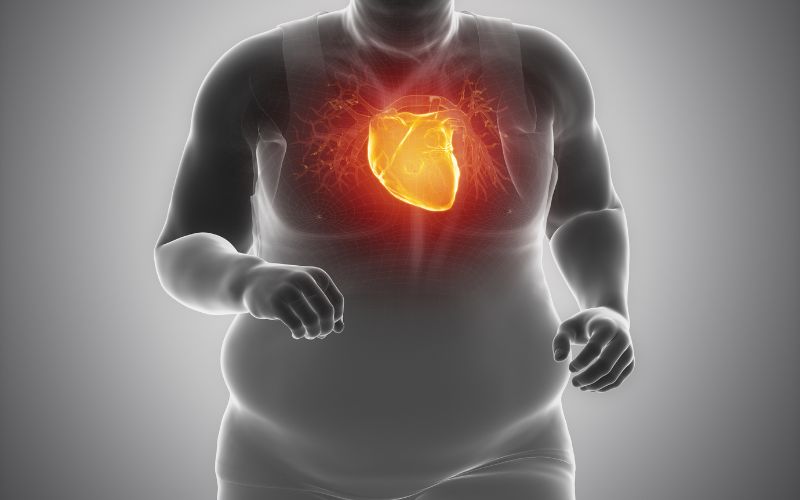10 Health Issues with Overweight and Obesity
Overweight and obesity have become major health concerns worldwide. With the prevalence of sedentary lifestyles and poor dietary choices, the number of individuals classified as overweight or obese has been steadily rising.
People who are overweight or obese face an increased risk of various serious diseases and health conditions compared to those who have a healthy weight.
These include high blood pressure (hypertension), imbalanced cholesterol levels (dyslipidemia), type 2 diabetes, coronary heart disease, stroke, gallbladder disease, osteoarthritis (joint deterioration), sleep apnea, breathing difficulties, and several types of cancer.
Additionally, individuals with excess weight often experience a lower quality of life, as they may suffer from mental illnesses like depression, anxiety, and other disorders. They may also encounter body pain and struggle with physical functioning.
This article aims to explore the health issues associated with these conditions, highlighting the importance of awareness and preventive measures.
Common health effects of being Overweight and Obesity?
The accumulation of abnormal or excessive fat, leading to overweight and obesity, is often associated with potential health impairments. They are primarily caused by an imbalance between calorie intake and expenditure. Factors contributing to this imbalance include unhealthy dietary patterns, physical inactivity, genetic predisposition, hormonal imbalances, and certain medications.
1. Cardiovascular Complications:

One of the most common health risks with overweight and obesity is cardiovascular disease. Excessive body weight increases the workload on the heart, leading to conditions such as hypertension (high blood pressure), coronary artery disease, and stroke.
These complications can have severe consequences, including heart attacks and heart failure. A stroke occurs when the blood supply to the brain is suddenly disrupted, either due to a blockage or the rupture of a blood vessel in the brain or neck.
This interruption in blood flow can lead to damage to brain tissue, resulting in difficulties such as impaired speech or the inability to move certain parts of the body.
2. Type 2 Diabetes:
Obesity is strongly linked with type 2 diabetes. The excess fat in the body interferes with the proper functioning of insulin, a hormone responsible for regulating blood sugar levels. As a result, obese individuals are at a higher risk of insulin resistance and the subsequent development of diabetes.
Type 2 diabetes can lead to various complications, including nerve damage, kidney disease, and vision problems. If you have a higher chance of developing type 2 diabetes, making some lifestyle changes can help prevent or delay its onset.
By losing 5 to 7 percent of your body weight and engaging in regular physical activity, you can reduce the risk of developing type 2 diabetes.
3. Respiratory Disorders:
Obesity can also impact the respiratory system, leading to breathing difficulties and sleep apnea. Excessive weight in the chest and abdomen can restrict lung expansion, causing decreased lung capacity and increased effort required for breathing.
Sleep apnea, a condition characterized by interrupted breathing during sleep, is more common in obese individuals and can lead to daytime drowsiness and increased risk of accidents.
4. Joint Problems:
The excess weight carried by overweight and obese individuals places additional stress on the joints, particularly in the knees and hips.
This can lead to the development or worsening of conditions such as osteoarthritis, a degenerative joint disease characterized by pain, stiffness, and reduced mobility.
Joint problems can significantly impact an individual’s quality of life and limit their ability to engage in physical activities.
5. Fatty Liver Diseases
Fatty liver diseases occur when fat accumulates in the liver. There are two main types: Nonalcoholic fatty liver disease (NAFLD) and Nonalcoholic Steatohepatitis (NASH). These conditions can cause significant damage to the liver, including the development of cirrhosis or even liver failure.
6. Kidney Disease
Kidney disease refers to the condition where the kidneys are damaged and unable to effectively filter blood as they should. Obesity increases the risk of developing diabetes and high blood pressure, which are the leading causes of kidney disease.
However, even in the absence of diabetes or high blood pressure, obesity alone can contribute to the development and progression of kidney disease.
7. High Blood Pressure
High blood pressure, also known as hypertension, occurs when the blood flows through the blood vessels with a force higher than what is considered normal.
This condition can put a strain on the heart, cause damage to the blood vessels, and increase the risk of serious health problems such as heart attack, stroke, kidney disease, and even death.
8. Pregnancy Problems

Being overweight or obese increases the risk of various health complications during pregnancy. Pregnant women who fall into these categories have a higher likelihood of developing gestational diabetes.
They are also more susceptible to experiencing preeclampsia, a condition characterized by high blood pressure during pregnancy that can lead to severe health issues for both the mother and the baby if not managed properly.
Additionally, overweight or obese pregnant women may require a cesarean section (C-section) delivery, which can prolong the recovery process after childbirth.
9. Stiffen Arteries
Obesity has a detrimental impact on your arteries, causing them to become thick and rigid due to associated conditions such as diabetes, high blood pressure, high cholesterol, and inflammation.
This cluster of conditions, known as metabolic syndrome, can be managed and treated. When the arteries narrow, they fail to deliver an adequate blood supply to the cells in your organs and tissues.
While you may not experience immediate symptoms, this compromised circulation can eventually lead to serious health complications like heart attack, heart failure, or stroke.
10. Psychological and Emotional Impact:
Overweight and obesity can also have significant psychological and emotional consequences. Body image dissatisfaction, low self-esteem, depression, and anxiety are commonly reported among individuals struggling with weight issues.
Social stigmatization and discrimination further exacerbate these challenges, leading to a negative impact on mental health.
What are obesity and overweight?
Overweight and obesity refer to the accumulation of an abnormal or excessive amount of fat in the body, which can have negative effects on health. To determine whether someone falls into these categories, a common measurement called body mass index (BMI) is used.
BMI is a straightforward index that compares a person’s weight to their height. To calculate it, you divide a person’s weight in kilograms by the square of their height in meters (kg/m2).

For Adults
According to the World Health Organization (WHO), overweight and obesity are defined as follows for adults:
- Overweight: A body mass index (BMI) greater than or equal to 25.
- Obesity: A body mass index (BMI) greater than or equal to 30.
BMI is considered the most practical measure for assessing overweight and obesity at the population level. It is the same for both sexes and applicable to adults of all ages.
However, it’s important to note that BMI is a general guide and may not accurately reflect the same level of fatness in different individuals. Factors such as muscle mass and body composition can affect the interpretation of BMI.
Strategies to Reduce Overweight and Obesity
Preventing obesity requires a comprehensive approach that includes adopting a healthy lifestyle, engaging in regular physical activity, and practicing healthy eating habits.
A balanced diet is crucial, which means including a variety of foods from all food groups like fruits, vegetables, whole grains, lean proteins, and healthy fats. It’s important to be mindful of portion sizes and avoid large servings of high-calorie foods.
On an individual level, people can take responsibility by:
- Limiting their intake of fats and sugars.
- Increasing consumption of fruits, vegetables, legumes, whole grains, and nuts.
- Engaging in regular physical activity, aiming for 60 minutes a day for children and 150 minutes spread throughout the week for adults.
However, individual efforts can only go so far if access to a healthy lifestyle is limited. Therefore, at a societal level, it is crucial to support individuals in following these recommendations.

The food industry also plays a significant role in promoting healthy diets by:
- Reducing the content of fats, sugars, and salt in processed foods.
- Ensuring that healthy and nutritious choices are affordable and accessible to all consumers.
- Restricting the marketing of foods high in sugars, salt, and fats, particularly those targeted at children and teenagers.
- Supporting the availability of healthy food choices and promoting regular physical activity within the workplace.
By combining efforts at both the individual and societal levels, we can create an environment that encourages and facilitates healthy choices, ultimately preventing overweight and obesity and their associated health problems.
Preventing Overweight and Obesity for a Healthier Future:
There are different types of bariatric surgeries available depending on the severity of the obesity. Gastric band surgery slows down food passage through the stomach, limiting the amount of food a person can eat.
Gastric bypass surgery involves creating a shorter pathway in the digestive system by connecting the stomach to a section of the small intestine further along the digestive tract.
Biliopancreatic diversion surgery removes a portion of the stomach, reducing the body’s ability to absorb nutrients effectively. Gastrectomy surgery removes a part of the stomach, which not only reduces food intake capacity but also decreases the production of ghrelin, a hormone associated with hunger.
It’s important to note that bariatric surgery is typically reserved for extreme cases of obesity and when other treatment options have been unsuccessful.
The decision to undergo any surgical procedure should be made in consultation with healthcare professionals and based on a thorough evaluation of the individual’s specific situation.
Conclusion:
Overweight and obesity pose serious health risks and can lead to a wide range of complications affecting various systems in the body.
Prevention and management of these conditions require a multifaceted approach, including a balanced diet, regular physical activity, behavior modifications, and access to supportive healthcare services.
By raising awareness and promoting healthy lifestyle choices, we can work towards reducing the prevalence of overweight and obesity and improving overall well-being.
Remember, it’s always important to consult with healthcare professionals for personalized advice and guidance regarding weight management and health-related concerns.







purchase androxal generic canada
cheapest buy androxal cheap uk buy purchase
purchase enclomiphene canada mail order
get enclomiphene generic online cheapest
buying rifaximin generic no prescription
get rifaximin price australia
get xifaxan united kingdom
Buy xifaxan on line no perscription
Buy staxyn online without a dr approval
how to buy staxyn price australia
cheap avodart medication interactions
cheapest price for avodart
cheapest buy dutasteride buy in the uk
how to buy dutasteride american pharmacy
canadian pharmacy flexeril cyclobenzaprine online
how to order flexeril cyclobenzaprine purchase from uk
gabapentin shipped over night without a perscription
how to order gabapentin cheap online no prescription
kamagra online bez lékařského předpisu
kamagra není nutný předpis
acheter générique kamagra australie
sans ordonnance kamagra acheter bon marche
generic fildena in pharmacy
online order fildena no prescription overnight delivery
Buy itraconazole overnight shipping
how to buy itraconazole cheap uk